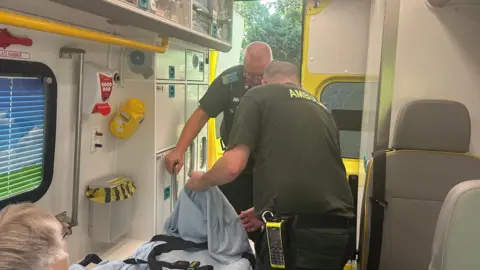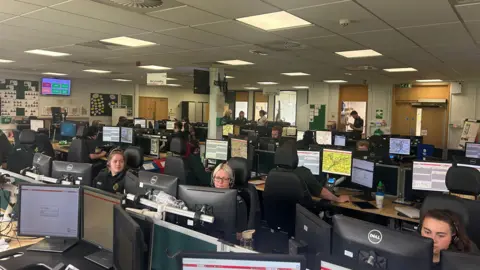Ambulance service 'ready for busy summer'
 BBC
BBCThe South Western Ambulance Service says it is ready for a significant rise in demand during the school summer holidays.
Every year, the region welcomes about 23 million visitors according to the South Western Ambulance Service NHS Foundation Trust (SWASFT) – that is on top of the 5.5 million people it already serves.
In the region more than one million emergency 999 calls are made each year.
Dr John Martin, chief executive of SWASFT, said: "We know the summer will be a busy period for us, so we want to make sure that we're there for everyone that needs us in a medical emergency."

SWASFT is encouraging residents and tourists to plan ahead to ensure a safe and healthy summer by:
- Knowing how to describe your exact location in a remote or rural area by using What3Words – a free app which converts your location into a unique three-word address, so the emergency services can find you.
- Making use of community pharmacies, which can advise on minor illnesses and provide medications.
- Being considerate when parking to make sure there is enough room for emergency service vehicles to pass through.
Dr Martin said: "We need your support to help us, help you, by asking you to choose the right care so we have crews available for patients with the most life-threatening conditions.
"999 is for when someone is seriously injured or ill and their life may be at risk. For example, if someone is unconscious, not breathing or is bleeding heavily."
The trust said it was leading the country in treating patients at home, which avoided unnecessary hospital visits.
Nearly a third (30.5%) of all patients in May were assessed and treated by paramedics at the scene without needing to be taken to hospital, it said.
The Trust's Emergency Operations Centres in Bristol and Exeter use a triage system to assess and prioritise calls.
Bosses said, in many cases, patients could be helped over the phone through the service's Hear and Treat initiative.
In May, 13,309 patients - about 14.5% of all callers - were treated remotely or directed to more appropriate NHS services without needing an ambulance on scene, the trust said.
Megan Barker, deputy head of clinical operations and safety, said: "If we can send our ambulances to patients who need them most, that's our ultimate goal."
Follow BBC Devon on X, Facebook and Instagram. Follow BBC Cornwall on X, Facebook and Instagram. Send your story ideas to [email protected].
